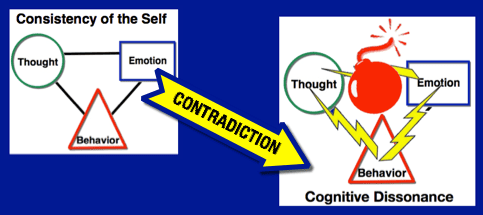A foolish consistency is the hobgoblin of little minds,
adored by little statesmen and philosophers and divines.
~ Ralph Waldo Emerson
By Cindy Kunsman
It helps us to understand how cognitive biases can skew our thinking, setting us up for predictable mistakes, but why do we resort to them?
First, we do it to cut through the overwhelming amount of information that we contend with to help us function more quickly, reducing the amount of thinking that we must do. But another cause compels us to lean on biases: They serve as a hiding place from realizations that challenge what we already believe. They help us avoid cognitive dissonance altogether when possible and to reduce its stress when it finds us.
We like, affirm and remember those things that support what we already know and believe. We might think that our brains help us to understand and realize information, but it so many ways, it softens, tailors, and modifies how we think and what we remember by helping us hide from anything that causes us discomfort. We are not masochists, we like to feel good, and our brains serve us by bending our perception to gloss over life’s rough edges – and our own rough edges, too.
Consistency and the Self
Consider the internal consistency of an individual as comprised of their thought, emotion, and action in a state of congruence and harmony. We human beings strive for consistency among these three aspects of our identity, and we experience pain when something pulls one of those aspects away from the others. Some experts maintain that this discord manifests as physical discomfort as well as psychological stress, so it’s not just something that we can train ourselves to ignore. Whether influences are good or bad for us, anything that disturbs our ‘norm’ and the accord among these aspects of self creates stress – and that stress is called cognitive dissonance.
We never have perfect information and are limited creatures in an imperfect world, but even with this understanding, failure leaves us with a degree of disappointment or shame. Our minds enlist cognitive biases to drop the stress that comes along with cognitive dissonance, using them as coping mechanisms. (Some are adaptive, and some prove to be maladaptive.) They aid us as we construct a meaningful narrative around the error with a spirit of kindness that preserves our personal sense of integrity. It’s those maladaptive ones that are used in the wrong place at the wrong time that put us in harm’s way.
Consistency and Others
We human beings also strive for consistency in our relationships. One author calls this drive “a nearly obsessive desire to be (and to appear to others as) consistent with what we’ve already done,” and our society rewards consistency. It allows us to conserve our limited energy by building on what we already know and have done in the past, saving us from the burden of thinking ‘from the ground up’. We can just do what we always do or what we did the last time when we were faced with a similar choice.
Manipulators exploit this human drive of consistency, and once they’ve hooked us in, we will do nearly anything to ensure that others see us the way we think of ourselves. When solicitors for charities make fund raising phone calls, they usually start out with asking their ‘mark’ (the person who picks up the phone) how they feel today. It is actually aimed at consistency, and by agreeing to answer “I’m doing well today,” it creates a basic social contract. It raises the likelihood that the mark will make a donation. The question seems wholly inconsequential, and that simplicity masks the compelling nature of the tactic.
Salespersons will tell a mark that “those who really care about their family’s well being will use nothing but this product.” Those who are unaware that we are hardwired to appear to be consistent will fall all over themselves to prove to their care and love for family by buying the product. However, we can disarm its power by understanding how it works. It’s the foolish consistencies that, as Ralph Waldo Emerson put it, become the hobgoblins that keep us trapped in the course of thought or action because we don’t like how we feel when we’re challenged.
Consider also the Image Consciousness that drives ideological totalist groups. Group members seek to live differently than others, and in most Quiverfull groups, they set a very high standard of righteousness. Their examples show people outside their group and those within it that they are superlatively unique and special to God, suggesting that they are better and more highly valued. This obsession with public image paints them in the best possible light.
We never master the drive for consistency, but we can anticipate that we are hardwired for self-deception. Understanding that commitment can be wielded against us because of our stubborn consistency, we can disarm a good bit of the automatic nature of such pressure – especially when resisting sales pitches. We can give ourselves the liberty to halt the process when we notice that it might be working against us.
Further Reading:
- Gilovich, Griffin, and Kahneman’s Heuristics and Biases
- Tavris and Aronson’s Mistakes Were Made (but not by Me)
- Cialdini’s Influence: The Psychology of Persuasion
- Hassan’s Combating Cult Mind Control
Cindy is a nurse who was raised in Word of Faith, a Second Generation Adult of cultic Christianity. She and her husband dabbled in Calvinism and Theonomy as a foil to Christian anti-intellectualism, and they were exit counseled together when the walked away from a church that embraced Gothard’s teachings. Cindy escaped many Quiverfull pitfalls but became a social pariah for failing to birth a family. She’s been decrying the abuses of the Patriarchy Movement since 2004, and she writes about spiritual abuse at her blog, Under Much Grace. Read more about her here.
She blogs at Under Much Grace, Enmeshed for Jesus, and Redeeming Dinah.
Stay in touch! Like No Longer Quivering on Facebook:
If this is your first time visiting NLQ please read our Welcome page and our Comment Policy! Commenting here means you agree to abide by our policies.
Copyright notice: If you use any content from NLQ, including any of our research or Quoting Quiverfull quotes, please give us credit and a link back to this site. All original content is owned by No Longer Quivering and Patheos.com
Read our hate mail at Jerks 4 Jesus
Check out today’s NLQ News at NLQ Newspaper
Contact NLQ at [email protected]













